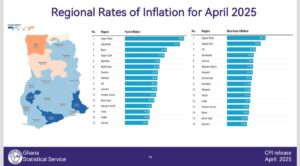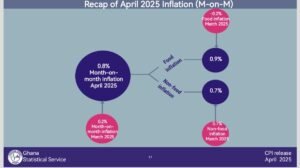
Inflation Slows Sharply, Hits 21.2% in April 2025
By Juliet ETEFE (juliet.etefe@thebftonline.com)
The inflation rate keeps dropping, as indicated by the Consumer Price Index (CPI) report for April 2025, which shows a yearly inflation rate of 21.2 percent.
This represents a decrease of 1.2 percentage points from the 22.4 percent noted in March 2025, marking five successive months of declining inflation as reported by the Ghana Statistical Service (GSS).
The Consumer Price Index (CPI), reflecting alterations in the typical cost of a consistent set of products and services bought by families, indicates that the month-over-month (m-o-m) inflation rate was 0.8% for April, an increase from 0.2% in March.

This indicates renewed pricing pressure in specific sectors; nonetheless, although the overall trend points towards decreasing inflation, the increase observed month over month warrants a careful optimistic stance and ongoing surveillance.
At a press conference, Government Statistician Dr. Alhassan Iddrisu presented the data, highlighting that both food inflation and non-food inflation played roles in the current statistics.
Significantly, food inflation in April stood at 25.0 percent year-over-year (y-on-y), which is a slight decrease from 26.5 percent in March. Meanwhile, non-food inflation decreased modestly to 17.9 percent from 18.7 percent.
Regional
In terms of regional variation, the Upper West Region experienced the highest inflation rate at 37.1 percent, whereas the Volta Region had the lowest at 18.3 percent.
This discrepancy highlights the differing inflationary pressures throughout the nation’s various regions, typically fueled by localized fluctuations in food and transportation sectors.
Imported and local items
Imported items saw year-on-year inflation of 18.7 percent\xa0 in March, compared to 24.0\xa0 percent for locally produced goods
These statistics underscore persistent challenges in the home production sector, notably in agriculture — an area that still significantly impacts food cost developments.
Recommendation
The recommendations from the GSS highlight cautious household expenditure, smart corporate pricing strategies, and strong governmental measures.
The service encourages the government to maintain efforts towards macroeconomic stability and speed up initiatives like the Agriculture for Transformation program to reduce food inflation.
It is suggested that improving public education about inflation processes could assist families in making well-informed financial choices.
Although the declining yearly inflation provides some comfort, the GSS emphasizes the importance of staying vigilant – especially considering the recent increase from month to month.
This fosters ongoing cooperation among the government, private sector, and consumers to solidify achievements and enhance economic stability.
Provided by SyndiGate Media Inc.
Syndigate.info
).
Share this content:



















Post Comment